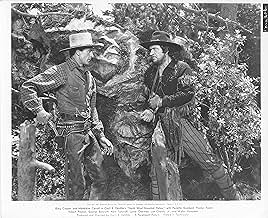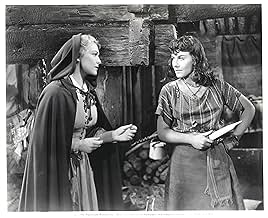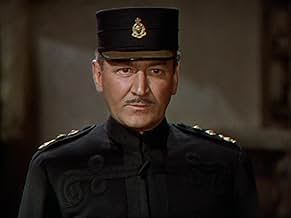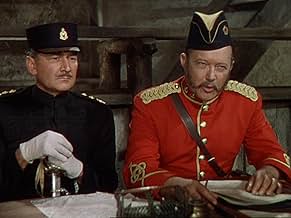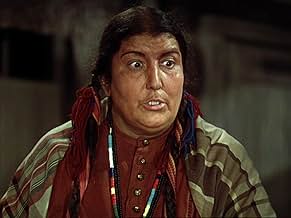IMDb RATING
6.3/10
1.9K
YOUR RATING
In 1885, a Texas Ranger travels to Canada to arrest a trapper who's wanted for murder and who's stirring up the Natives in a rebellion against the Canadian government.In 1885, a Texas Ranger travels to Canada to arrest a trapper who's wanted for murder and who's stirring up the Natives in a rebellion against the Canadian government.In 1885, a Texas Ranger travels to Canada to arrest a trapper who's wanted for murder and who's stirring up the Natives in a rebellion against the Canadian government.
- Won 1 Oscar
- 2 wins & 4 nominations total
Storyline
Did you know
- TriviaCecil B. DeMille initially thought Paulette Goddard was all wrong for the role of the half-breed Indian girl. Marlene Dietrich, Vivien Leigh, Katherine DeMille, Simone Simon, Anna Sten, Olympe Bradna, and Steffi Duna were considered for the part, but when Goddard showed up in his office in costume and make-up speaking pidgin English, he cast her.
- GoofsJust before heading out to find Corbeau, Rivers helps April up onto her wagon. A few minutes later we see her climb up again, on her own.
- Quotes
Dusty Rivers: Down where I come from we don't jump to conclusions. It's liable to be a feller's last jump.
- Alternate versionsThe UK DVD is cut by 6 secs with edits to cruel horsefalls.
- ConnectionsFeatured in Cecil B. DeMille: American Epic (2004)
Featured review
Cecil B. DeMille's fame as a leading movie director is still secure because of his innovative nature. He certainly developed spectacle movies, and even today he is remembered as the pioneer. But that does not blind us to his flaws. His characters are not three dimensional usually but black or white in personality. His dialog is for the birds. He does fall into stereotypes too often. It is understandable that the Medveds included "Northwest Mounted Police" among the 50 worst movies ever made.
Yet one can't easily dismiss it. It was DeMille's first color movie. It was the second of four films with Gary Cooper, one of four made Goddard and one of three made with Robert Preston. Preston made good action films in this period but was always in support. In the early 1950s he returned to the stage and the fame that eluded him in Hollywood. Came "The Music Man", "The Lion In Winter", and "Mack and Mabel" and the recognition of Preston the adept entertainer. Came the call back to Hollywood for his filmed performances as Harold Hill and Toddy (in "Victor/Victoria"). Preston was that rarity: an actor who proved his star qualities in middle-age. DeMille would never have been his kind of director: he had no light touch for comedy, and he did not do musicals. Still, for some good straight performances as doomed weaklings, Preston did well in this film,"Union Pacific", and "Reap the Wild Wind".
The film's historic content is interesting. DeMille's earlier historic films ("Cleopatra", "Sign of the Cross", "The Crusades") dealt with old world history. But after the last DeMille concentrated on American history with "The Plainsman", "The Buccaneer", "Union Pacific", "Reap The Wild Wind", and "The Unconquered". Even the modern "The Story of Dr. Wassell" was based on a true tale connected with the current war in the Pacific.
Because of his American History period "Northwest Mounted Police" is an odd film. Cooper's character is the only link in it to American history in the 1880s, as a Texas Ranger after George Bancroft (Le Corbeau) for murder. The film is set firmly in Canada which was the scene of two revolts of the Metis people under Louis Riel in 1870 and 1885. As such this becomes somewhat unique among the historic films of Hollywood.
Canada does poorly regarding it's history in Hollywood. This movie actually covers one of the most troubling moments of modern Canadian history: the fate of Louis Riel. We don't know about it down here. Riel was a lawyer and teacher with some mental problems. Riel helped found the provinces of Manitoba and Saskatchewan, thus making him one of Canadian history's founding fathers. But he was also aware that French Canadians and his Metis people got a suspiciously short deal from the British Canadians in Canada. Canada was firmly controlled by the Tory party led by Sir John MacDonald. MacDonald was corrupt but made one of the great comebacks in political history in 1879. Riel had led a revolt in 1870 which was crushed. He fled to the U.S., and spent some time in asylums here. He was released, taught school in Montana, and then returned to Canada (illegally) in 1884. He organized a second Metis revolt, which nearly succeeded in winning an independent state. A British army crushed it in 1885, captured Riel, and he was tried for treason.
Lives had been lost, and property destroyed. MacDonald's son had been sent to Manitoba to run the province, and he had been humiliated by the revolt. Riel, however, had some legitimate gripes about the treatment of French Canadians, and the Metis. The treason trial came, and he was found guilty. MacDonald apparently never had a moment's hesitation about what to do. He refused to stop Riel's execution. The Tory Party in Canada has never recovered from this mistake. The backbone of Liberal Party strength (to the current day) is French Canadien Quebec - they have never forgiven the Tories for not acting humanely to Louis (and putting him in a Canadian asylum for life).
DeMille is not totally anti-Riel. Riel is not unlike the American John Brown (inthe contemporary film "Santa Fe Trail"), who is murderous and possibly insane but fighting for certain principles that actually get the audience's sympathy. In this film, Riel is committed to a Metis revolt and state and he will stop at nothing to prevent it's success. But he also is shown as a kindly man to young children (he was a school teacher, remember).He is trying to save a way of life that a juggernaut threatens. And he is resigned to his fate at the end, realizing that in dying he may still win (which happened). We need a subsidiary villain like Van Heflin in "Sante Fe Trail" who is villainous for money. Here it is Bancroft, a murderer and criminal who is Riel's assistant. His villainy is passed down through his genes to his daughter (Goddard) who tempts and betrays Preston. One wonders, had Riel formed a successful government and state, how long before Le Corbeau would have arranged an "accident" or "assassination" (by a "Tory" agent, of course) of Riel, in order to cement his control over the Metis nation. So when he gets his just deserts at the end, unlike poor Louis, we are cheered by it. One has to congratulate DeMille in trying to be fair to Louis, when he could have just made his a super villain.
Yet one can't easily dismiss it. It was DeMille's first color movie. It was the second of four films with Gary Cooper, one of four made Goddard and one of three made with Robert Preston. Preston made good action films in this period but was always in support. In the early 1950s he returned to the stage and the fame that eluded him in Hollywood. Came "The Music Man", "The Lion In Winter", and "Mack and Mabel" and the recognition of Preston the adept entertainer. Came the call back to Hollywood for his filmed performances as Harold Hill and Toddy (in "Victor/Victoria"). Preston was that rarity: an actor who proved his star qualities in middle-age. DeMille would never have been his kind of director: he had no light touch for comedy, and he did not do musicals. Still, for some good straight performances as doomed weaklings, Preston did well in this film,"Union Pacific", and "Reap the Wild Wind".
The film's historic content is interesting. DeMille's earlier historic films ("Cleopatra", "Sign of the Cross", "The Crusades") dealt with old world history. But after the last DeMille concentrated on American history with "The Plainsman", "The Buccaneer", "Union Pacific", "Reap The Wild Wind", and "The Unconquered". Even the modern "The Story of Dr. Wassell" was based on a true tale connected with the current war in the Pacific.
Because of his American History period "Northwest Mounted Police" is an odd film. Cooper's character is the only link in it to American history in the 1880s, as a Texas Ranger after George Bancroft (Le Corbeau) for murder. The film is set firmly in Canada which was the scene of two revolts of the Metis people under Louis Riel in 1870 and 1885. As such this becomes somewhat unique among the historic films of Hollywood.
Canada does poorly regarding it's history in Hollywood. This movie actually covers one of the most troubling moments of modern Canadian history: the fate of Louis Riel. We don't know about it down here. Riel was a lawyer and teacher with some mental problems. Riel helped found the provinces of Manitoba and Saskatchewan, thus making him one of Canadian history's founding fathers. But he was also aware that French Canadians and his Metis people got a suspiciously short deal from the British Canadians in Canada. Canada was firmly controlled by the Tory party led by Sir John MacDonald. MacDonald was corrupt but made one of the great comebacks in political history in 1879. Riel had led a revolt in 1870 which was crushed. He fled to the U.S., and spent some time in asylums here. He was released, taught school in Montana, and then returned to Canada (illegally) in 1884. He organized a second Metis revolt, which nearly succeeded in winning an independent state. A British army crushed it in 1885, captured Riel, and he was tried for treason.
Lives had been lost, and property destroyed. MacDonald's son had been sent to Manitoba to run the province, and he had been humiliated by the revolt. Riel, however, had some legitimate gripes about the treatment of French Canadians, and the Metis. The treason trial came, and he was found guilty. MacDonald apparently never had a moment's hesitation about what to do. He refused to stop Riel's execution. The Tory Party in Canada has never recovered from this mistake. The backbone of Liberal Party strength (to the current day) is French Canadien Quebec - they have never forgiven the Tories for not acting humanely to Louis (and putting him in a Canadian asylum for life).
DeMille is not totally anti-Riel. Riel is not unlike the American John Brown (inthe contemporary film "Santa Fe Trail"), who is murderous and possibly insane but fighting for certain principles that actually get the audience's sympathy. In this film, Riel is committed to a Metis revolt and state and he will stop at nothing to prevent it's success. But he also is shown as a kindly man to young children (he was a school teacher, remember).He is trying to save a way of life that a juggernaut threatens. And he is resigned to his fate at the end, realizing that in dying he may still win (which happened). We need a subsidiary villain like Van Heflin in "Sante Fe Trail" who is villainous for money. Here it is Bancroft, a murderer and criminal who is Riel's assistant. His villainy is passed down through his genes to his daughter (Goddard) who tempts and betrays Preston. One wonders, had Riel formed a successful government and state, how long before Le Corbeau would have arranged an "accident" or "assassination" (by a "Tory" agent, of course) of Riel, in order to cement his control over the Metis nation. So when he gets his just deserts at the end, unlike poor Louis, we are cheered by it. One has to congratulate DeMille in trying to be fair to Louis, when he could have just made his a super villain.
- theowinthrop
- Feb 26, 2005
- Permalink
- How long is North West Mounted Police?Powered by Alexa
Details
- Runtime2 hours 6 minutes
- Aspect ratio
- 1.37 : 1
Contribute to this page
Suggest an edit or add missing content

Top Gap
By what name was North West Mounted Police (1940) officially released in India in English?
Answer
